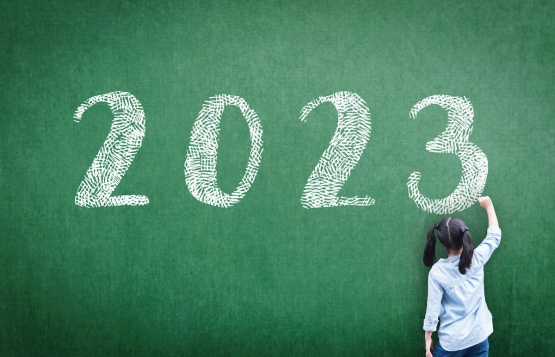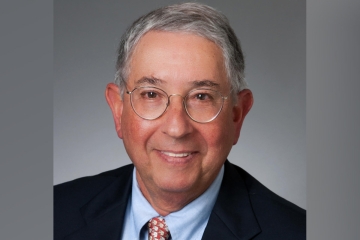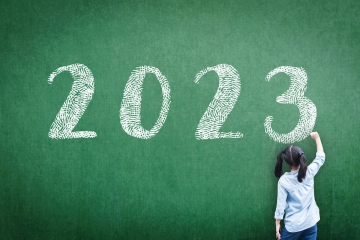
Disappointment and hope: K–12’s biggest stories from 2023
This year marked the fortieth anniversary of “A Nation at Risk,” the seminal report that did so much to reshape America’s modern education landscape.

This year marked the fortieth anniversary of “A Nation at Risk,” the seminal report that did so much to reshape America’s modern education landscape.








This year marked the fortieth anniversary of “A Nation at Risk,” the seminal report that did so much to reshape America’s modern education landscape. In the four decades since its publication, there have been unsung highs—like the rise in student achievement in the early aughts—and unwelcome lows, such as the post-Covid achievement crash that’s still with us. Indeed, nary a year has passed without both positive and negative developments, many of them traceable to the education-quake that NCLB triggered. This past year was no different. Here’s a roundup of some of the biggest ed headlines from 2023.
Sleepwalking through learning loss
The year’s leading story, once again, was the string of disappointing post-pandemic test results, but this time followed by an ominous sense of fatalistic complacency, as if there’s really nothing to be done about it and that’s OK. Notwithstanding historically low NAEP numbers in reading and math reported in June, U.S. Secretary of Education Miguel Cardona made the dubious assertion that several states had returned to pre-pandemic levels. What’s more, when the PISA results dropped two weeks ago, Cardona—in a display of despicable schadenfreude—cheerily underscored the rise in America’s relative performance. Andy Rotherham rightly described it as a “profile in porridge.”
Flunking history and civics
The bad news in 2023 wasn’t limited to the three Rs. In May, history and civics scores fell, too, with the latter marking the first decline in the subject since the NAEP civics tests were first administered in 1998. This time, Cardona attributed the drop to the pursuit in GOP states of so called “book bans,” but that’s just a red herring. What’s more likely is the nation’s inattention to and low regard for these subjects. So long as schools don’t see inculcating good citizenship as central to their mission, it's hard to imagine young people having any interest, let alone investment, in building a more perfect Union.
Record-setting chronic absenteeism
One explanation progress has been so ploddingly slow is the high number of students (and in too many cases, teachers) who are simply missing from school. Since the pandemic, there has been a cultural shift in expectations: many students and parents now consider attendance to be optional rather than compulsory. Among the most egregious was Detroit, where seventy-seven percent(!) of students missed at least ten percent of the academic year. Other districts are shifting to four-day school weeks (and four-day weekends!) to combat the problem. Tutoring, summer school, and suchlike won’t matter much if kids and adults aren’t in class. Closing schools for reasons altogether unrelated to health and safety (more below) is further evidence that some have lost the plot.
Labor strife on the left coast
The Portland Association of Teachers injected new meaning into the term “No School November” when they shut down the state’s largest school district for eleven days last month. Back in April, Los Angeles teachers struck a deal after joining support staff in shuttering classrooms for three days. In May, Oakland educators walked off the job for seven days. It’s hard to argue with the need to improve teacher compensation, but doing so at the expense of children following Covid is the wrong way to go about it—especially when some local officials are assuaging unions with imaginary money.
A(nother) banner year for school choice
It wasn’t all bad in 2023 though. In January, Iowa Governor Kim Reynolds signed into law a statewide ESA program with no income limits. The last few years have been historic ones for education freedom and parental options, with the nation’s lackluster response to Covid proving to be a boon. Ten states have now adopted universal or near-universal private-school choice programs. This is no small feat, as that number was exactly zero only three years ago. The fortunes of public school choice (i.e., charter schools) were decidedly more mixed. And yet, there are many reasons to remain bullish—not least the uptick in charter enrollment as traditional public schools continue to hemorrhage students.
Reading science comes into its own (finally)
Curriculum and pedagogy often take a backseat to policy prescriptions, but that hasn’t been the case for the last several years—especially when it comes to the science of reading. Since 2013, thirty-two states and D.C. have passed laws or implemented new policies around evidence-based reading instruction. This year, Georgia, Indiana, New Mexico, Virginia, and Wisconsin passed new reading legislation. The Hunt Institute’s Path Forward initiative—I serve on its national advisory board—has been doing yeoman’s work in supporting many of these states to improve literacy outcomes.
Don’t mess with Texas school reform
Governor Greg Abbott’s school voucher proposal fell short again this year, but the Lone Star State nevertheless remains in a class of its own when it comes to education reform. The state’s takeover of Houston demonstrates an intolerance for mediocrity that many other states have already resigned themselves to. Encouragingly, the small but vocal resistance there stands little chance against an intrepid and steadfast superintendent along with a community that is hungry for change. Texas is blazing new ground in other ways, too, raising the bar on academic expectations and opening the doors to advanced math for Black and Hispanic students.
Artificial intelligence everywhere
ChatGPT and AI took schools by storm in 2023. Days after its release at the tail end of last year, districts like New York City, Seattle, and Los Angeles were falling over themselves to ban it. Most have since come around, recognizing the potential upsides and the need to embrace its potential. AI is already serving in several teaching and learning roles. One teacher recently told me how it’s saving her time on grading, helping to score essays after being fed a writing rubric she designed. It’s early days, and there are plenty of reasons to proceed with caution, but anecdotes like this have me upbeat.
Through it all were evergreen concerns about implementation and execution, emerging debates like the one around the proper role, if any, of smartphones in schools—amplified by the throttling of student engagement post-pandemic—as well as re-emerging efforts to bring bipartisanship back to this neck of the woods. It probably won’t happen anytime soon, but a journey of a thousand miles begins with a single step.

Every week in the Education Gadfly, we flag a handful of news items for our “Cheers and Jeers” section. Here are the ten most fantastic or horrendous developments of the year that was, presented in chronological order.
Best
Worst

2023 was often a year of contrasts. We experienced the magic and possibility of artificial intelligence, but began wrestling with its current and future harms. We saw school choice expand across the country, but witnessed growing resistance to it that’s bad for families. And we kept trying to make education more equitable for marginalized groups, but found out how that laudable end can lead to misguided policies in some of America’s biggest cities.
At Fordham we did our best to keep up with this, following our established practice of asking tough questions, conducting rigorous research, debating issues, and proposing workable solutions whenever we could. This is evident our 2023 commentary, which comprised around 400 Flypaper stories, 125 newsletters, and 50 podcasts, spanning every education issue facing the nation. Here are Fordham’s ten most-read posts.
10. How lax grading policies make classrooms chaotic, by Meredith Coffey, May 4
Since the return to in-person learning, schools have seen a surge in all types of student misbehavior, ranging from minor classroom disruptions to serious physical violence. Experts cite a host of causes. As a high school English teacher, however, Coffey found that one thing in particular most impacted her students’ behavior and her ability to manage it: recent slackening of grading policies. Read more.
9. We know student effort matters, so let’s start acting like it, by Eva Moskowitz, March 16
Student effort is the secret sauce at Success Academy charter schools, said their founder and CEO, and they teach and celebrate it religiously. Indeed, after seventeen years of educating tens of thousands of students, careful analysis of homework, classwork, and assessment data has taught the Success Academy team that a large proportion of errors, up to 70 percent, don’t result from not knowing or understanding the content, but from a lack of care and attention to detail. Read more.
8. 9 thoughts on the Advanced Placement takedown in the Times, by Michael J. Petrilli, November 20
Before the Thanksgiving holiday, the New York Times published a hard-hitting 2,300-word expose by Dana Goldstein and colleagues asking “Why is the College Board pushing to expand Advanced Placement?” It's good that journalists are putting the AP program under the microscope. It’s just too bad that the Times didn’t offer a more balanced look. Read more.
7. Worldwide, learning loss and pandemic school closures were directly connected, by Jeff Murray, June 1
A 2023 World Bank working paper found that, whatever the reason for extended school closures during the pandemic, each additional week of shuttered doors worsened learning loss by another 1 percent of a standard deviation. In short, the longer schools stayed closed, the less students learned, no matter what else was done to blunt the losses. Read more.
6. It’s time to dump Reading Recovery, by Aaron Churchill, July 27
This summer, Ohio joined a growing list of states and districts that require schools to use high-quality instructional materials aligned to the science of reading. If implemented well, the state will become a model for how leaders across the country can rigorously implement such laws. Part of that will involve eliminating popular but flawed intervention programs for struggling students—including one called Reading Recovery. Read more.
5. How one school district is balancing excellence and equity—and another isn’t, by Brandon L. Wright, February 22
Reducing racial and ethnic gaps in advanced achievement is a major focus of the advanced learning field (a.k.a. “gifted” education), and from these efforts have emerged two common strategies. One, wherein leaders work to enroll more marginalized children in the offerings and improve program quality and breadth, shows real promise. The other, in which school systems eliminate advanced learning opportunities altogether, doesn’t. Read more.
4. Should schools ban cellphones? by Tim Daly, December 8
We should ban students from using their phones during the school day, but that maybe the easy part. Harder is implementing the policy so it works. Schools should invest in secure, signal-blocking phone pouches; establish rules for teachers, not just students; and attach a reasonable but significant penalty for violating school phone rules. Read more.
3. Algebra for none: The effects of San Francisco’s de-tracking reform, by Jeanette Luna, April 13
Starting in 2019, supposedly in the name of equity, San Francisco’s barred all students from taking Algebra until ninth grade. A 2023 study of the policy found—surprise, surprise—that it has a null impact on the advanced course-taking and credit attainment of marginalized students, as well as harmful effects on those who would’ve otherwise taken Algebra earlier. Other evidence also suggests that the policy has exacerbated inequalities. The policy is, in other words, a massive failure. Read more.
2. Soft-on-consequences discipline is terrible for teachers, by Daniel Buck, February 9
While most discussion about student behavior perhaps rightly focuses on its impact on students—the telos of a school is educating children, after all—too often the effects on teachers are overlooked. They’re collateral damage that seldom gets a mention. Read more.
1. At long last, E.D. Hirsch, Jr. gets his due: New research shows big benefits from Core Knowledge, by Robert Pondiscio, April 13
A remarkable long-term study by University of Virginia researchers led by David Grissmer demonstrated unusually robust and beneficial effects on reading achievement among students in schools that teach E.D. Hirsch’s Core Knowledge curriculum. The paper offered compelling evidence to support what many of us have long believed: Hirsch has been right all along about what it takes to build reading comprehension. Read more.

Every week in the Education Gadfly, we flag a handful of articles in our “What We’re Reading” section. Mostly these are opinion pieces, usually from leading newspapers and magazines, or occasionally high-profile Substacks. Here’s our list of our favorites for the year, presented in chronological order.
Long-time followers of Fordham’s work may remember the pre-internet era, when we published hard-bound compilations of articles like these in our Selected Readings on School Reform. And in the pre-Fordham era, those were disseminated by the Education Excellence Network. We’re glad to continue the tradition of highlighting and sharing great writing and thinking on education reform.
For additional articles, see Mike McShane’s “Great Education Writing From 2023,” or the list of Fordham’s most popular posts from the year that was.
Ø Advances in artificial intelligence and big data could lead to a “Big Bang” in education research. —Mark Schneider
Ø “The strange death of education reform” —Matthew Yglesias, parts one, two, three, and four
Ø “Egalitarianism is important but we neglect STEM education at our peril.” —Noah Smith
Ø For education, artificial intelligence tools will likely succeed where other technologies failed. —John Bailey
Ø Democrats are growing increasingly hostile to meritocracy, putting them at odds with the general public. —Ruy Teixeira
Ø Schools should be phone-free zones, as a growing body of research shows that they inhibit academic, cognitive, and social development. —Jon Haidt
Ø Defying stereotypes, Mississippi makes trailblazing progress in reading instruction. —Nicholas Kristof
Ø Centrists can reboot education reform. —Liam Kerr
Ø As rudeness, polarization, and rates of violence are surging, perhaps the reason why is really quite simple: We’re no longer focused on moral education. —David Brooks
Ø Mississippi didn’t fudge its reading gains with student retention, but achieved real, lasting academic improvements through smart policy. —Washington Post Editorial Board
Ø The pandemic set Americans back not just in education, but in crime and mortality rates as well. —David Wallace Wells
Ø One columnist’s experience getting kicked out of school for lying about her address so she could attend a better school. —Barbara Martinez, Mosaic
Ø Here are the concrete policies and practices districts can implement to remedy chronic absenteeism. —Boston Globe Editorial Board
Ø The charter sector keeps growing across the country, opening new schools and racking up policy victories. —Jed Wallace, Education Next
Ø Schools and teachers should drop the “leave to succeed” narrative. —Sharif El-Mekki, Education Week

The venerable hosts of the Education Gadfly show have been winging it for seventeen years. From East to Kanye West, from No Child Left Behind to grade inflation, the show has been chronicling the stories in American education, hashing through the most important debates in ed reform, hosting thought leaders and policy makers, and stumbling through mic checks for 900 episodes now. This year has been no different.
Below are the top 5 episodes from 2023:
1. #859: Eliminating honors classes won’t advance equity, with Scott Peters
In February, the Wall Street Journal ran the head-scratch-inducing headline “To Increase Equity, School Districts Eliminate Honors Classes.” Scott Peters, a senior research scientist at NWEA, joined Mike to discuss the self-contradictory nature of that idea. Drawing from the Fordham-led National Working Group on Advanced Education, they cast a vision for how advanced classes can promote equity and best practices for challenging gifted students.
2. #851: The case for teaching writing in the age of ChatGPT, with Checker Finn
Last year, ChatGPT took the American commentariat by storm. Columnists penned enough ink to fill the Mediterranean, parsing through what this new technology meant and whether our robot overlords would keep us around. Fordham’s president emeritus and OG gadfly, Checker Finn, lays out the case that writing education trains students to do far more than write a five-paragraph essay, and so while SkyNet might destroy the world, the need for writing instruction will survive.
3. #857: The states leading the way in literacy, with Kymyona Burk and Tom Greene
As of July, thirty two states and the District of Columbia have passed science of reading laws. They range from mandatory teacher prep and curriculum directives to accountability measures and early-grade retention policies. Kymyona Burk and Tom Greene, both of ExcelinEd, join Mike to discuss the strengths and pitfalls of these policies, which states are leading, and if phonics will become just another partisan football.
4. #897: Addressing grade inflation, with Tim Daly
For at least a decade now, grades have been trending upwards. Then, with the onset of the pandemic and understandable measures towards leniency that many districts adopted, they spiked. Tim Daly, the chief executive officer of Ed Navigator, joined Mike to discuss practical measures schools and districts could take to arrest this inflation.
5. How much competition public schools face, with Jeanette Luna
Exposing traditional school districts to greater competition has been a central goal of education reform for decades. But quantifying how much competition public schools actually face is a challenging task. Jeanette Luna, Fordham’s development and research associate, joins Mike along with her co-author David Griffith to discuss her report that tries to pin down this very question.
At perhaps not time since the landmark A Nation at Risk has American education faced so many challenges and obstacles. But a quick survey of this year’s Education Gadfly Show gives many reasons for optimism. Namely, there are practitioners, policymakers, and academics working tirelessly to find solutions, implement effective policies, and deliver the education that children so deserve.

On this week’s Education Gadfly Show podcast, Checker Finn, Fordham’s president emeritus—and the original Education Gadfly—joins Mike and David to discuss the best and worst developments in education reform in 2023. Then, on the Research Minute, Amber reviews the best education research of the year.
Recommended content:
Feedback Welcome: Have ideas for improving our podcast? Send them to Daniel Buck at [email protected].

Cheers
Jeers
